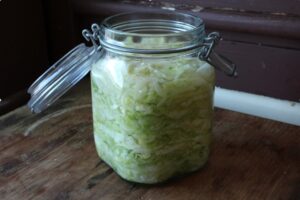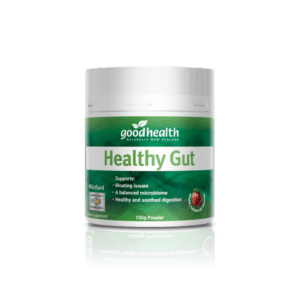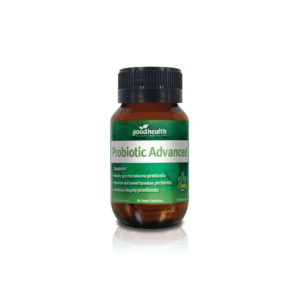
The quality of our digestion, the integrity of our gut wall, and the balance of the microbes living in our gut can affect our mood, immune function, skin, weight or body composition, and health and well-being. Supporting a healthy gut is essential for our overall health, happiness, and ability to live a longer life.

Why is gut health important?
The gut is often referred to as the body’s ‘second brain’ and, as with the brain, the gut impacts virtually every system in the body. A well-balanced gut microbiome supports digestion, nutrient absorption, mental health, and immune function. The ecosystem of microbes, mostly bacterial, that resides inside the gut affects how we digest and absorb our food and also impacts the way we think and feel. It’s a complex system, but the way to a happy digestion can be relatively simple. Gut health supplements, probiotics, and prebiotics can help restore balance, but diet and lifestyle also play crucial roles in maintaining good gut health.
10 signs you may have an unhealthy gut
Recognising poor gut health symptoms early can help you take steps to restore balance. Here are 10 signs you may have an unhealthy gut:
- Digestive issues, e.g., bloating, flatulence, sluggish, or overactive bowels
- Poor immune health, recurring immune issues, or phlegm issues
- Food sensitivities or irregular bowel movements
- Low mood and increased stress levels
- Chronic fatigue, low energy, stiff joints
- Irritability or mood swings
- Skin breakouts and dryness
- Bad breath – halitosis
- Brain fog, cravings, poor mental health
- Trouble maintaining a healthy weight
What determines gut health?
A healthy gut is characterised by how well it breaks down food particles and absorbs nutrients and how easily it lets go of waste. Digestion starts in the brain (cephalic phase) with the anticipation of eating something that looks tasty. Then the mouth gets involved, with enzymes and mastication (chewing), followed by the stomach—mechanical and secretive digestion. Then the intestines, small to large, get involved with absorption and a little bit of fermentation (we are no longer big fermenters like our ape-like ancestors).
The gut needs:
- healthy secretions at the correct stages
- a well-functioning pancreas and liver
- healthy mucosal and muscular layers
- well-formed villi and microvilli for absorption
- the correct amount of mucus
- a healthy enteric nervous system
- a well-balanced microbiome
- food that is species specific
- calm and relaxation when eating
- good chewing technique
- appropriate lifestyle practices (sunlight exposure, stress relief, etc.)
The gut wall is a filtering barrier
The small intestinal gut wall acts as a filtering barrier, allowing helpful micronutrients to be absorbed into the bloodstream and preventing harmful bacteria, toxins, and undigested food particles from passing through. The permeability of the gut lining fluctuates according to the requirements of digestion and absorption. Permeability is chiefly regulated by a protein called zonulin. Higher zonulin release means a more permeable gut lining. Excess serotonin in the gut from stress, irritation, too much fibre, etc., can also increase the permeability or leakiness of the intestinal wall. Over time, a consistently high level of permeability and/or damage to the intestinal mucosa and intestinal wall can result in foreign substances passing into the bloodstream. Damage to the intestines affects microbial balance and enzyme production. Foreign substances in the bloodstream can cause an unhealthy and often ongoing immune response in the body.
Although the small intestines do the lion’s share of the absorptive work, the colon does absorb some nutritive substances, including sodium, potassium, and potentially vitamin K2, depending on the health and balance of the microbiome, the bulk of which resides in the colon.
What affects gut health?
The gut lining needs specific nutrients to stay healthy and have integrity. If undigested food particles enter the bloodstream, the body may react every time that particular food is consumed, or it might start reacting to a variety of leaked proteins or endotoxins in the bloodstream. Poor diet, stress, environmental toxins, infections, medications, some plant compounds, and drug and alcohol abuse can affect gut health. Additionally, gluten, from gluten-containing grains like wheat, rye, and barley, has been shown to trigger the release of zonulin.
Stress weakens the immune system, and around 80% of the immune system lies in the gut. Stress also decreases digestive function, because digestion is not required when running away from or fighting a threat like a sabre-toothed tiger! Many medications, taken short- or long-term, may irritate the stomach and intestinal lining. Antibiotics can kill both the helpful and harmful bacteria, which may lead to an imbalance of the gut flora. High-sugar diets have been known to affect gut flora, and the cells in the lower gut lining rely on fatty acids produced by certain gut microbes. Too much fibre can tax the digestive system, and some plant compounds, such as lectins, solanines, saponins, etc., have been shown to lead to irritation of the gut lining.
How to support gut health naturally
The good news is that you can reset your gut health through diet and lifestyle changes. There are a number of things you can do to support intestinal health and even the integrity and permeability of your gut lining. Making short- and long-term dietary changes and eliminating foods that your body may treat as toxic is a good first step. Then you can address the stressors in your life and implement coping strategies.
 Common problematic foods include wheat and other grains, nuts/seeds, ultra-processed and additive-filled dairy products, seed/vegetable oils, refined sugars, and food additives (colourings, flavourings, and preservatives). Eliminating ultra-processed foods and focusing on whole foods is key.
Common problematic foods include wheat and other grains, nuts/seeds, ultra-processed and additive-filled dairy products, seed/vegetable oils, refined sugars, and food additives (colourings, flavourings, and preservatives). Eliminating ultra-processed foods and focusing on whole foods is key.
- prioritise nutrient-dense animal foods along with their fat and collagen, which are essential for the health of gut tissue. Collagen broths are a must!
- Enjoy fruits and above- and below-ground vegetables, herbs, and spices that you enjoy, providing additional nutrition and phytochemicals, and the little bit of fibre (you don’t need a lot…) that your gut microbes will love.
- probiotic foods, e.g., kimchi, sauerkraut, and kefir, to support the balance of the gut microbiota and its alpha diversity.
Not fearing sea salt is also a good idea. We need sodium and the other minerals in a whole-food, unrefined salt like Celtic Sea salt to augment the minerals in our food (caveat: salt requirements are also individual; find your balance). The chloride in unrefined salt supports stomach acid production and minerals keep our digestion humming and our bowels regular. This local, seasonal, whole-food diet approach will help to support a healthy intestinal lining and encourage good bacterial growth.
Probiotics vs. prebiotics: what’s the difference?
Prebiotic, probiotic, and postbiotics have been shown to support a healthy and calm gut environment. Prebiotics are foods like collagen (bone broth) and some types of plant fibre. Probiotics are fermented foods like sauerkraut and kefir/yoghurt. Postbiotics are the breakdown products of microbial life in the gut, and many are beneficial to the gut lining and our general health.
Naturally supportive nutrients and herbs
Zinc supports cell repair and supports a healthy immune system. The most bioavailable source is animal foods, especially meat, organs, and shellfish.
Glutamine is an amino acid that supports healthy zonulin levels, protects the gut wall, and is the main fuel source for the cells that line the intestines. Glutamine is found in high-protein foods but is at least twice as bioavailable in animal proteins than in plant proteins.
Liquorice root is a flavonoid-rich herb that supports and soothes the gut lining. It has been shown in research to support a healthy digestion and bowel regularity. Deglycyrrhised liquorice is a form used most often.
Beta-carotene can support the gut microbiota, a healthy immune response in the gut, and intestinal barrier function (gut permeability). Beta-carotene is a plant pigment that gives fruits and vegetables their orange and yellow color. Beta-carotene is found in many fruits and vegetables, such as carrots, squash, pumpkins, and sweet potato. It is also found in pasture-raised meats.
Aloe vera is an ancient herbal support for regular bowel movements and a soothed digestive tract.
Gut health supplements: do you need them?
While diet plays a primary role in gut health, supplementation can provide additional support. Good Health Healthy Gut and Good Health Probiotic Advanced offer scientifically developed formulas to support digestion and gut microbiome balance.
 Good Health Healthy Gut
Good Health Healthy Gut
Good Health Healthy Gut is a scientifically developed formula specifically designed to calm bloating, support intestinal cell repair and regular bowel movements, and soothe an irritated gut. Healthy Gut contains GutGard®, the postbiotic EpiCor®, glutamine, beta-carotene, zinc and aloe vera to support a healthy gut lining, a bloat-free digestion, and a balanced microbiome.
 Good Health Probiotic Advanced
Good Health Probiotic Advanced
Good Health Probiotic Advanced is a scientifically researched, triple action, prebiotic, probiotic, and postbiotic gut support. The prebiotic supports growth of good gut bacteria in the microbiome. The probiotics are specific, potent strains for gut health that support healthy digestion and bowel function. The postbiotic is an advanced, inert microorganism that supports gut lining integrity and a healthy immune system. Probiotic Advanced supports a healthy microbiome and bowel function, calms bloating, and supports the immune system.
For more helpful, gut supporting tips, see Had a gutsful? How to support your gut health
